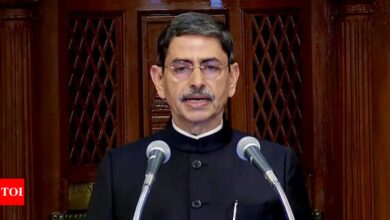India
TOI Dialogues: ‘Promoting public-private partnerships is essential for growth of tourism in Uttarakhand’ | India News – Times of India



The second edition of TOI’s flagship event, TOI Dialogues, took place in Dehradun on Tuesday and focused on Uttarakhand‘s growth story. The event focused on the state’s socio-economic development, sporting excellence, entrepreneurial aspirations and infrastructure developments.
The first panel, moderated by renowned RJ Raunacseveral important topics were discussed.
Sunil Alagheconomist and founder of SKA Advisors Pvt Ltd, said: “Internally, investing in infrastructure, especially roads, is crucial. It is important to focus on controlling corruption and ensuring efficient use of resources. In addition, promoting public-private partnerships is essential, especially in the tourism sector, where such collaborations can significantly enhance development and growth.”
Doctor Pankaj K PandeyIAS, Secretary, PWD, explained, “In the past, our national highways were mostly single-lane, but today we have decided to expand them to dual and even four-lane. Similarly, we are upgrading our state highways from single-lane to dual-lane. For other major roads connecting important locations such as cities or districts, we are planning expansions based on traffic analyses and research inputs. We are also prioritizing road safety by installing crash barriers on both national and state highways. During this process, we are carefully considering ecological factors and terrain, such as mountainous areas, to ensure a balanced approach.”
On the topic of skill development, Sunil Alagh added: “Ultimately, there is a real need to change the attitude and approach towards skill development across sectors. The progress that each state makes in skill development is crucial for its overall growth and success.”
Addressing the expansion of credit access for rural entrepreneurs and farmers, Govinda Rajulu ChintalaNABARD Chairman, noted, “Uttarakhand has immense potential, with an ecosystem very similar to the Alps of Switzerland. However, the Alps have developed differently, with effective environmental protection and avalanche control. Climate change is a pressing issue for both Uttarakhand and Himachal Pradesh, affecting rainfall patterns and agriculture.”
He added, “Agriculture is crucial in Uttarakhand with 60% of the population dependent on the primary sector. This sector needs a resilient ecosystem to adapt to climate change. NABARD has several programmes to address these challenges including water management, watershed development, landslide and erosion control and integrated farming systems. With around 1 lakh people in the state, protecting livelihoods is essential and NABARD is working to improve the conditions through its initiatives.”
Moderator Raunac Questions were also asked about the balance between economic development and the preservation of culture and the environment. Radhika JhaIAS, secretary of Rural developmentresponded: “Among all the states, Uttarakhand is uniquely positioned to be a leader in environmental sustainability, with priority given to environmental stewardship and green initiatives. In terms of rural development, our focus extends beyond infrastructure – such as housing, bridges and road development – to improving the livelihoods of our people. We have over 6 lakh women involved in Self-Help Groups (SHGs), spread across 68,000 groups engaged in diverse livelihood activities including organic farming, local product branding and promoting our unique arts.”
“In our sustainability efforts, especially in rural development, we ensure that the ecological balance is maintained. We strive to protect local communities from adverse impacts during the implementation of infrastructure and hydropower projects,” she added.
The first panel, moderated by renowned RJ Raunacseveral important topics were discussed.
Sunil Alagheconomist and founder of SKA Advisors Pvt Ltd, said: “Internally, investing in infrastructure, especially roads, is crucial. It is important to focus on controlling corruption and ensuring efficient use of resources. In addition, promoting public-private partnerships is essential, especially in the tourism sector, where such collaborations can significantly enhance development and growth.”
Doctor Pankaj K PandeyIAS, Secretary, PWD, explained, “In the past, our national highways were mostly single-lane, but today we have decided to expand them to dual and even four-lane. Similarly, we are upgrading our state highways from single-lane to dual-lane. For other major roads connecting important locations such as cities or districts, we are planning expansions based on traffic analyses and research inputs. We are also prioritizing road safety by installing crash barriers on both national and state highways. During this process, we are carefully considering ecological factors and terrain, such as mountainous areas, to ensure a balanced approach.”
On the topic of skill development, Sunil Alagh added: “Ultimately, there is a real need to change the attitude and approach towards skill development across sectors. The progress that each state makes in skill development is crucial for its overall growth and success.”
Addressing the expansion of credit access for rural entrepreneurs and farmers, Govinda Rajulu ChintalaNABARD Chairman, noted, “Uttarakhand has immense potential, with an ecosystem very similar to the Alps of Switzerland. However, the Alps have developed differently, with effective environmental protection and avalanche control. Climate change is a pressing issue for both Uttarakhand and Himachal Pradesh, affecting rainfall patterns and agriculture.”
He added, “Agriculture is crucial in Uttarakhand with 60% of the population dependent on the primary sector. This sector needs a resilient ecosystem to adapt to climate change. NABARD has several programmes to address these challenges including water management, watershed development, landslide and erosion control and integrated farming systems. With around 1 lakh people in the state, protecting livelihoods is essential and NABARD is working to improve the conditions through its initiatives.”
Moderator Raunac Questions were also asked about the balance between economic development and the preservation of culture and the environment. Radhika JhaIAS, secretary of Rural developmentresponded: “Among all the states, Uttarakhand is uniquely positioned to be a leader in environmental sustainability, with priority given to environmental stewardship and green initiatives. In terms of rural development, our focus extends beyond infrastructure – such as housing, bridges and road development – to improving the livelihoods of our people. We have over 6 lakh women involved in Self-Help Groups (SHGs), spread across 68,000 groups engaged in diverse livelihood activities including organic farming, local product branding and promoting our unique arts.”
“In our sustainability efforts, especially in rural development, we ensure that the ecological balance is maintained. We strive to protect local communities from adverse impacts during the implementation of infrastructure and hydropower projects,” she added.




